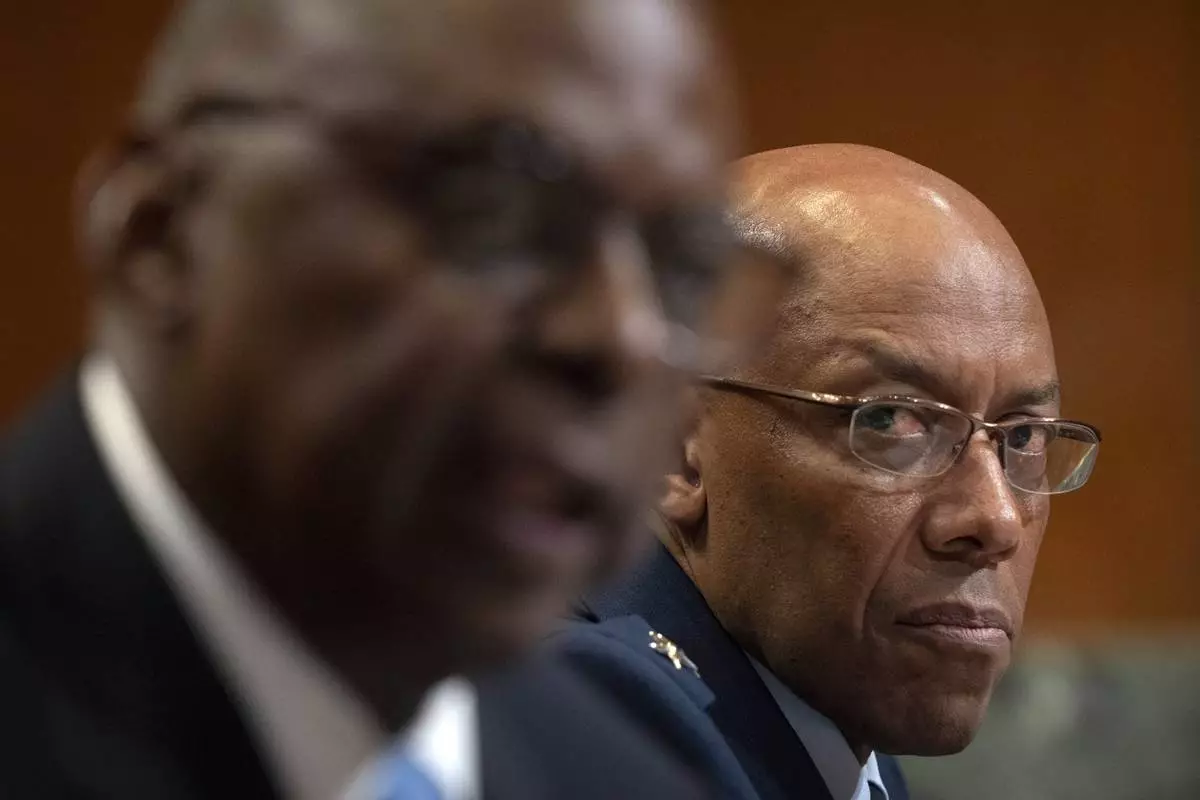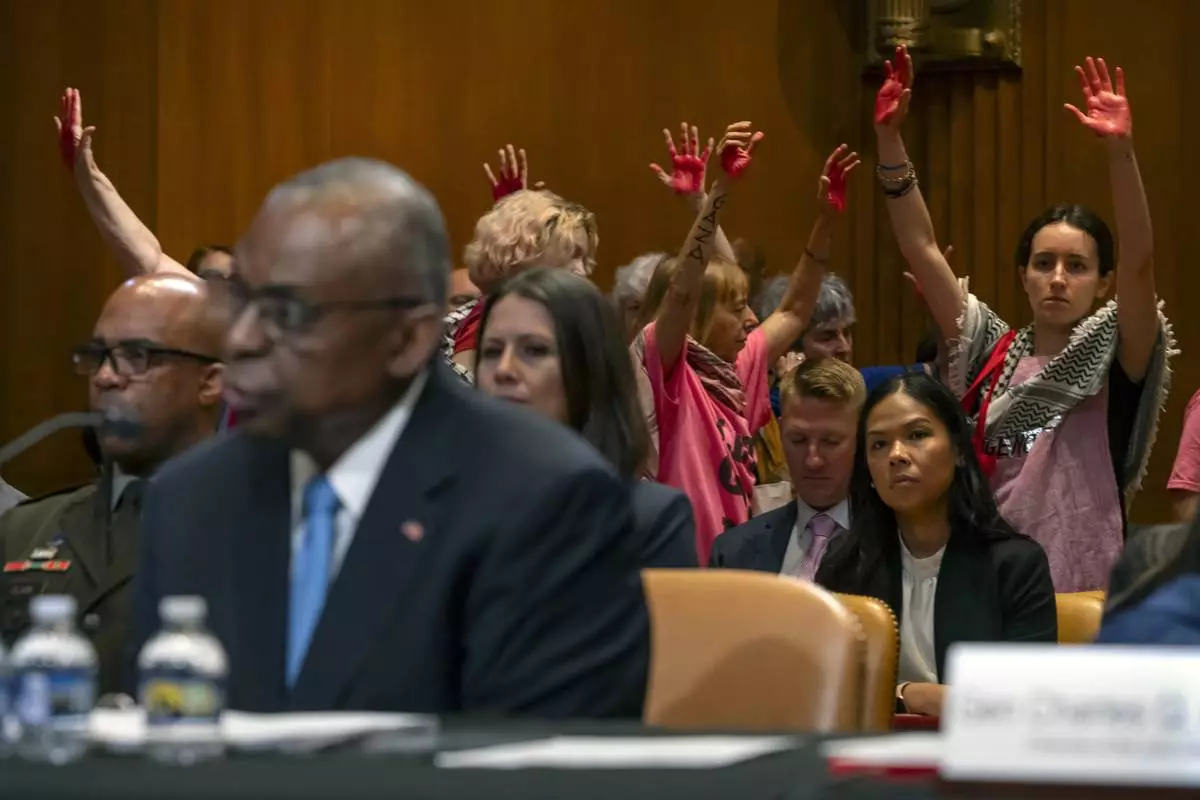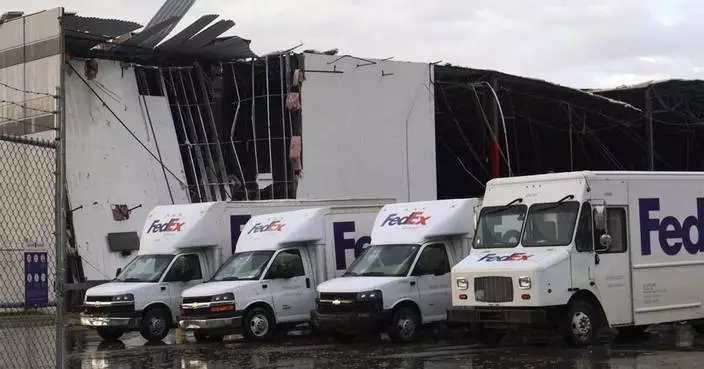The Latest on reaction across America to the first glimpse into the release of Special Counsel Robert Mueller's Russia investigation (all times local):
7:20 p.m.
Michael Tucker of Bancroft, West Virginia, is not a fan of President Donald Trump. But the 44-year-old truck driver says he does not believe the president was treated fairly in the Russia investigation.

President Donald Trump speaks with the media after stepping off Marine One on the South Lawn of the White House, Sunday, March 24, 2019, in Washington. The Justice Department said Sunday that special counsel Robert Mueller's investigation did not find evidence that President Donald Trump's campaign "conspired or coordinated" with Russia to influence the 2016 presidential election. (AP PhotoAlex Brandon)
He also doesn't think Special Counsel Robert Mueller's report will bring an end to questions about the president and Russia.
While shopping at a farm supply store Sunday in Cross Lanes, West Virginia, Tucker called the Russia investigation "a joke, for the most part."
Tucker says if Trump colluded with Russia, "they would have come up with something by now. It's one witch hunt after another, basically. If they could have found anything, they would have."
Tucker says he's confident that Mueller did "what he was hired to do" and has mixed feelings about whether Democrats should have pressed for an investigation into Trump's Russia ties.
Tucker said he considers himself an independent voter but would vote for Trump again compared to anyone currently in the Democratic field.
In Oklahoma City, Fernando Sevilla, a Republican who voted for Trump, said Trump is "doing a great job" and that he believes the Mueller investigation was "witch hunts."
Sevilla said, "I don't think he went with Russia at all. He added, "He's a businessman, he was never a politician. Politicians to me they're just a bunch of crooks. They promise you one thing and they do another."
While Democrats were right to seek the investigation, he said Trump has not been treated fairly.
The 66-year-old Sevilla said the investigation did not answer questions he has about Trump's Democratic opponent in the 2016 election, former Secretary of State Hillary Clinton, and the whereabouts of thousands of deleted emails.
In Detroit, 36-year-old William Braasch has been following the Mueller probe from its start and — while disappointed in what Barr released Sunday afternoon— he's not surprised.
Braasch, a registered nurse, said, "I honestly doubted that much would come out, given that Barr was appointed by Trump. I'm not any more let down than I would have been before with this administration and the investigations."
Braasch added that he is "looking forward" to Congressional investigations of Trump and investigations in New York state into Trump's foundation.
Sue Arani, an accountant, was walking her dog and checking news on her phone Sunday in downtown Los Angeles. The 57-year-old Arani is originally from Iran but has been a US citizen since 1981. She describes herself as "Republican leaning," but said she voted for Hillary in 2016.
Arani said the full report should "absolutely" be made public immediately, "in the name of full transparency."
She said the public must see the report, "especially before the next election." She also said the White House shouldn't be allowed to spin the results: "Trump is famous for lying too much."
Arani trusts Mueller: "I'm sure, based on his excellent reputation, that he did a complete job in his investigation. But he is in between a rock and a hard place, politically."
Arani personally believes that there was likely collusion between the Trump campaign and Russia. "But it's possible that a lot of stuff wasn't disclosed from the lower levels to the top (within the campaign). They might have kept Trump in the dark on purpose, so he could stay beneath it all. Maybe that was his idea too."
Nora Kubiaczyk (pronounced koo-bee-AH-che) lives in Minneapolis, works in advertising, leans Democratic and considers herself "pretty liberal." She voted for Clinton in 2016. In an interview Sunday in downtown Minneapolis she said, "I'm not shocked. It seems like with each of these investigations, there's always going to seem like something like it's a coup, or there's somebody that seems like a smoking gun, and then it will be like yesterday's news in no moment and Trump will keep walking on."
She said it seemed there moments where Mueller was going after Trump and others where there were "a couple fumbles."
7:10 p.m.
Many Republicans are cheering and Democrats are scoffing as first word on the details of special counsel Robert Muller's investigation emerge.
For supporters of President Donald Trump, the four-page summary of the investigative findings released by Attorney General William Barr felt like an exoneration of the man they back.
For Trump's opponents, some of whom had visions of the Mueller's work ending with the president being led away in handcuffs, it is a disappointment.
What seemed certain in the wake of Sunday's release was that it marked no end to the political divide, to the fierce criticism of Trump or to calls for more of Mueller's report to be released.
Associated Press writers Corey Williams in Detroit, Jeff Baenen in Minneapolis, Minnesota, Tim Talley in Oklahoma City, Oklahoma, Christopher Weber in Los Angeles and John Raby in West Virginia, contributed to this story.
WASHINGTON (AP) — The Biden administration paused a shipment of bombs to Israel last week over concerns that the country was approaching a decision on launching a full-scale assault on the southern Gaza city of Rafah against the wishes of the United States, Defense Secretary Lloyd Austin said Wednesday.
The shipment was supposed to consist of 1,800 2,000-pound (900-kilogram) bombs and 1,700 500-pound (225-kilogram) bombs, according to the official who spoke on the condition of anonymity to discuss the sensitive matter. The focus of U.S. concern was the larger explosives and how they could be used in a dense urban setting like Rafah where more than 1 million civilians are sheltering after evacuating other parts of Gaza amid Israel’s war on Hamas, which came after the militant group’s deadly attack on Israel on Oct. 7.
Austin confirmed the weapons delay, telling the Senate Appropriations subcommittee on defense that the U.S. paused “one shipment of high payload munitions.”
“We’re going to continue to do what’s necessary to ensure that Israel has the means to defend itself,” Austin said. “But that said, we are currently reviewing some near-term security assistance shipments in the context of unfolding events in Rafah.”
The U.S. has historically provided enormous amounts of military aid to Israel. That has only accelerated in the aftermath of Hamas’ Oct. 7 attack that killed some 1,200 in Israel and led to about 250 being taken captive by militants. The pausing of the aid shipment is the most striking manifestation of the growing daylight between Israel Prime Minister Benjamin Netanyahu’s government and the administration of Democratic President Joe Biden, which has called on Israel to do far more to protect the lives of innocent civilians in Gaza.
It also comes as the Biden administration is due to deliver a first-of-its-kind formal verdict this week on whether the airstrikes on Gaza and restrictions on delivery of aid have violated international and U.S. laws designed to spare civilians from the worst horrors of war. A decision against Israel would further add to pressure on Biden to curb the flow of weapons and money to Israel’s military.
Biden signed off on the pause in an order conveyed last week to the Pentagon, according to U.S. officials who were not authorized to comment on the matter. The White House National Security Council sought to keep the decision out of the public eye for several days until it had a better understanding of the scope of Israel’s intensified military operations in Rafah and until Biden could deliver a long-planned speech on Tuesday to mark Holocaust Remembrance Day.
Biden’s administration in April began reviewing future transfers of military assistance as Netanyahu’s government appeared to move closer toward an invasion of Rafah, despite months of opposition from the White House. The official said the decision to pause the shipment was made last week and no final decision had been made yet on whether to proceed with the shipment at a later date.
U.S. officials had declined for days to comment on the halted transfer, word of which came as Biden on Tuesday described U.S. support for Israel as “ironclad, even when we disagree.”
Press secretary Karine Jean-Pierre declined to square the arms holdup with Biden’s rhetoric in support of Israel, saying only, “Two things could be true.”
Israel’s ambassador to the United Nations, Gilad Erdan, in an interview with Israeli Channel 12 TV news, said the decision to pause the shipment was “a very disappointing decision, even frustrating." He suggested the move stemmed from political pressure on Biden from Congress, the U.S. campus protests and the upcoming election.
Biden has faced pressure from some on the left — and condemnation from the critics on the right who say Biden has moderated his support for an essential Mideast ally.
“If we stop weapons necessary to destroy the enemies of the state of Israel at a time of great peril, we will pay a price,” said Sen. Lindsey Graham, R-S.C., his voice rising in anger during an exchange with Austin. “This is obscene. It is absurd. Give Israel what they need to fight the war they can’t afford to lose.”
Independent Sen. Bernie Sanders of Vermont, a Biden ally, said in a statement the pause on big bombs must be a “first step.”
“Our leverage is clear,” Sanders said. “Over the years, the United States has provided tens of billions of dollars in military aid to Israel. We can no longer be complicit in Netanyahu’s horrific war against the Palestinian people.”
Austin, meanwhile, told lawmakers that "it’s about having the right kinds of weapons for the task at hand.”
"A small diameter bomb, which is a precision weapon, that’s very useful in a dense, built-up environment,” he said, “but maybe not so much a 2,000-pound bomb that could create a lot of collateral damage.” He said the U.S. wants to see Israel do “more precise” operations.
Israeli troops on Tuesday seized control of Gaza’s vital Rafah border crossing in what the White House described as a limited operation that stopped short of the full-on Israeli invasion of the city that Biden has repeatedly warned against on humanitarian grounds, most recently in a Monday call with Netanyahu.
Israel has ordered the evacuation of 100,000 Palestinians from the city. Israeli forces have also carried out what it describes as “targeted strikes” on the eastern part of Rafah and captured the Rafah crossing, a critical conduit for the flow of humanitarian aid along the Gaza-Egypt border.
Privately, concern has mounted inside the White House about what’s unfolding in Rafah, but publicly administration officials have stressed that they did not think the operations had defied Biden’s warnings against a widescale operation in the city.
The State Department is separately considering whether to approve the continued transfer of Joint Direct Attack Munition kits, which place precision guidance systems onto bombs, to Israel, but the review didn’t pertain to imminent shipments.
The U.S. dropped the 2,000-pound bomb sparingly in its long war against the Islamic State militant group. Israel, by contrast, has used the bomb frequently in the seven-month Gaza war. Experts say the use of the weapon, in part, has helped drive the enormous Palestinian casualty count that the Hamas-run health ministry puts at more than 34,000 dead, though it doesn’t distinguish between militants and civilians.
The U.S.-Israel relationship has been close through both Democratic and Republican administrations. But there have been other moments of deep tension since Israel's founding in which U.S. leaders have threatened to hold up aid in attempt to sway Israeli leadership.
President Dwight Eisenhower pressured Israel with the threat of sanctions into withdrawing from the Sinai in 1957 in the midst of the Suez Crisis. Ronald Reagan delayed the delivery of F16 fighter jets to Israel at a time of escalating violence in the Middle East. President George H.W. Bush held up $10 billion in loan guarantees to force the cessation of Israeli settlement activity in the occupied territories.
__
Associated Press writers Josef Federman in Jerusalem and Lolita C. Baldor and Matthew Lee contributed to this report.

Chairman of the Joint Chiefs of Staff Air Force Gen. CQ Brown, right, listens as Secretary of Defense Lloyd Austin, left, speaks during a hearing of the Senate Appropriations Committee Subcommittee on Defense on Capitol Hill, Wednesday, May 8, 2024, in Washington. (AP Photo/Mark Schiefelbein)

Protestors opposed to the war between Israel and Hamas stand before a hearing of the Senate Appropriations Committee Subcommittee on Defense with Secretary of Defense Lloyd Austin and Chairman of the Joint Chiefs of Staff Air Force Gen. CQ Brown on Capitol Hill, Wednesday, May 8, 2024, in Washington. (AP Photo/Mark Schiefelbein)

Sen. Lindsey Graham, R-S.C., speaks during a hearing of the Senate Appropriations Committee Subcommittee on Defense with Secretary of Defense Lloyd Austin and Chairman of the Joint Chiefs of Staff Air Force Gen. CQ Brown on Capitol Hill, Wednesday, May 8, 2024, in Washington. (AP Photo/Mark Schiefelbein)

Protestors opposed to the Israel-Hamas war are escorted out as Secretary of Defense Lloyd Austin, left, speaks during a hearing of the Senate Appropriations Committee Subcommittee on Defense on Capitol Hill, Wednesday, May 8, 2024, in Washington. (AP Photo/Mark Schiefelbein)

Secretary of Defense Lloyd Austin attends a hearing of the Senate Appropriations Committee Subcommittee on Defense on Capitol Hill, Wednesday, May 8, 2024, in Washington. (AP Photo/Mark Schiefelbein)

White House press secretary Karine Jean-Pierre speaks during a briefing at the White House, Tuesday, May 7, 2024, in Washington. (AP Photo/Evan Vucci)

President Joe Biden speaks at the U.S. Holocaust Memorial Museum's Annual Days of Remembrance ceremony at the U.S. Capitol, Tuesday, May 7, 2024 in Washington. (AP Photo/Evan Vucci)

Pentagon chief confirms US has paused bomb shipment to Israel to signal concerns over Rafah invasion

Pentagon chief confirms US has paused bomb shipment to Israel to signal concerns over Rafah invasion

Smoke rises following an Israeli airstrike east of Rafah, Gaza Strip, Monday, May 6, 2024. (AP Photo/Ismael Abu Dayyah)




















